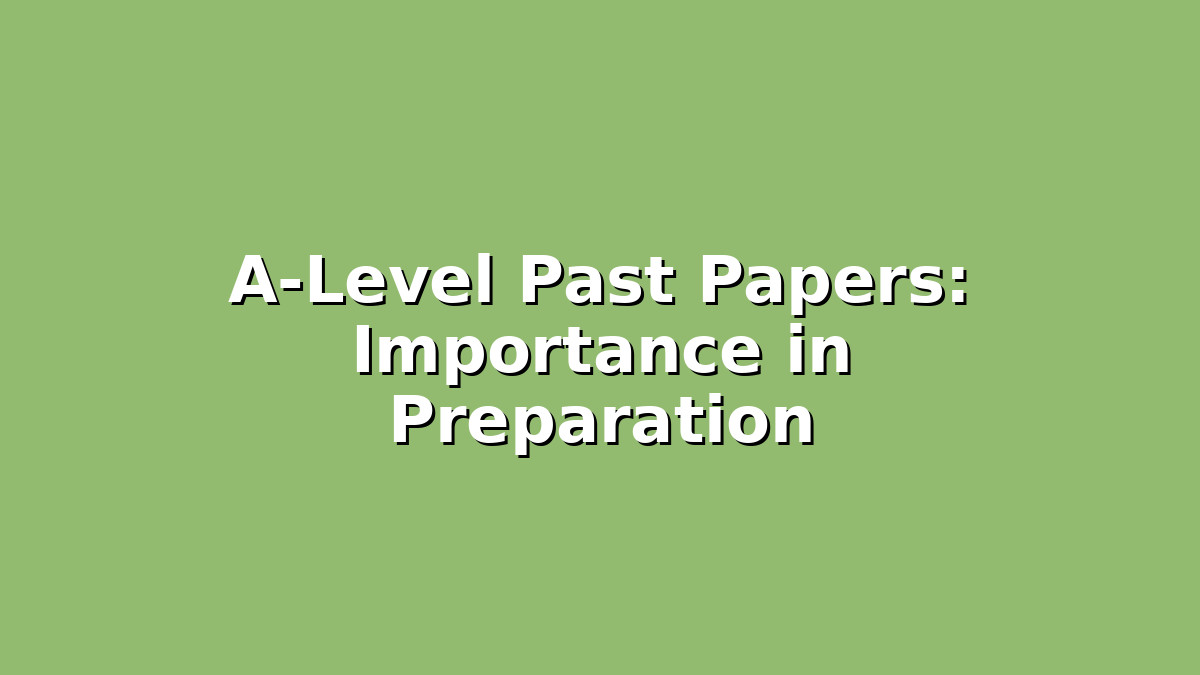Preparing for A-Level exams can be a challenging journey that requires effective study strategies, consistent practice, and smart use of available resources. One of the most valuable tools at your disposal is A-Level past papers. These past papers don’t just provide practice questions—they offer insight into exam patterns, important topics, and time management skills essential for exam success. In this article, we will explore why A-Level past papers are crucial for your preparation and provide practical advice on how to make the most out of them.
Understanding the Exam Format and Question Styles
One of the biggest challenges students face when preparing for A-Level exams is understanding the exam format and the types of questions that typically appear. Each subject has a unique structure—whether it’s multiple-choice questions, essay-style responses, problem-solving tasks, or data analysis. A-Level past papers give you a firsthand look at these formats, helping you become familiar with the question styles before you enter the exam hall.
By working through past papers, you can identify which types of questions carry the most marks and which topics are frequently tested. For example, you might notice that certain question formats appear every year, such as short answer questions in biology or data response questions in economics. This familiarity reduces exam-day anxiety because you know what to expect. Additionally, it helps you focus your revision on areas where you can maximize your scores.
Study Tip: When practicing past papers, don’t just answer questions randomly. Instead, simulate exam conditions by timing yourself and working in a quiet environment. This practice will improve your exam technique and boost your confidence.
Identifying Knowledge Gaps and Weak Areas
Another major benefit of using A-Level past papers is that they help you identify your strengths and weaknesses. When you attempt these papers, grading your answers honestly allows you to see which topics you’ve mastered and which require more attention. This insight is invaluable because it helps you prioritize your revision time effectively.
For instance, if you struggle with certain calculus problems in maths or essay questions in history, you can focus on these areas rather than spending equal time on all topics. Tackling your weak points early in your revision schedule gives you more time to improve and reduces the chance of surprises during the actual exam.
It’s also important to review the marking schemes and examiner reports that often accompany past papers. These resources explain how marks are awarded and what examiners look for in high-scoring answers. Understanding these criteria can guide you in structuring your responses more effectively, ensuring that you gain maximum marks.
Study Tip: Keep a revision journal where you record the topics you find difficult after each past paper session. Regularly review this journal to monitor your progress and adjust your study plan accordingly.
Enhancing Time Management Skills
Time management is crucial during A-Level exams. Many students know the content well but struggle to complete all questions within the set time. Practicing past papers under timed conditions is the best way to improve your speed and accuracy.
When you work through a past paper, try to allocate time for each section or question based on the marks available. This exercise trains you to pace yourself, ensuring that you don’t spend too long on difficult questions at the expense of easier ones. Over time, timed practice helps you develop an internal clock to judge how long you should spend on each part of the exam.
Moreover, repeated exposure to timed practice reduces exam stress. You become more comfortable with the pressure of working against the clock, and your brain learns to think quickly and efficiently under these conditions.
Study Tip: After completing a timed past paper, review your answers and note where you spent too much or too little time. Try to refine your approach in subsequent attempts, aiming for a balanced pace that covers all questions thoroughly.
Conclusion
A-Level past papers are more than just practice questions—they are a window into the exam itself. Using past papers effectively helps you understand the exam format, identify and improve weak areas, and develop strong time management skills. By incorporating past papers into your revision strategy, you boost your confidence and improve your chances of achieving the grades you want.
Remember, consistent practice is key. Combine past papers with other revision methods like summarizing notes, group study, and seeking help from teachers to create a comprehensive study plan. Approach your revision with a positive mindset and use past papers as your guide to success. With dedication and smart preparation, you can tackle your A-Level exams with confidence and perform at your best.
Good luck with your studies!

Responses